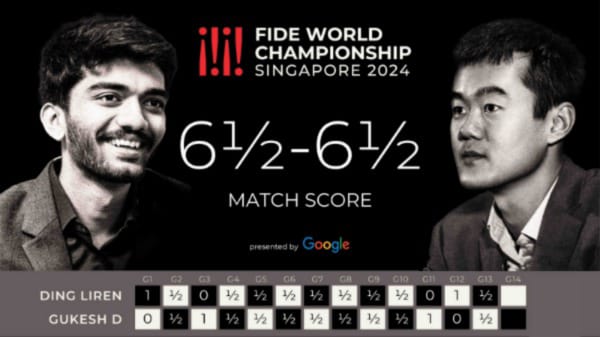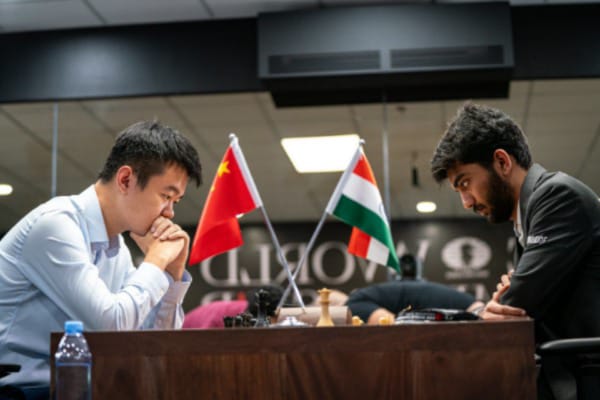Gukesh D Vs Ding Liren: Gukesh D Scripts History – Becomes The Youngest World Chess Champion after Defeating Ding Liren
At just 18 years old, Gukesh D has shattered expectations and made history in the world of chess. His stunning victory at the World Chess Championship has sent shockwaves through the global chess community, marking the arrival of a new chess prodigy. Gukesh’s triumph over the reigning champion, Ding Liren, in a nail-biting 14-game battle has propelled him to the title of the youngest classical chess world champion, breaking a 38-year-old record held by the legendary Garry Kasparov. This electrifying victory is not only a monumental personal achievement for Gukesh but also a proud moment for India, a nation that has quickly become a powerhouse in the world of chess.

The Decisive Showdown: A Battle of Minds and Nerves
The championship match between Gukesh and Ding was nothing short of epic. Tension hung thick in the air as the series reached its climax, with both players tied at 6.5-6.5 heading into the final game. The stakes couldn’t have been higher. Gukesh, playing with black pieces, displayed an unparalleled level of calm and focus. What seemed destined to end in a draw turned on its head when Ding made a costly blunder on move 53. Gukesh seized the opportunity with the precision of a seasoned champion, using his endgame mastery to secure a 7.5-6.5 victory and claim the World Chess Championship title.
This wasn’t just a game of moves—it was a psychological showdown. As the clock ticked down and the pressure reached its peak, Gukesh stood firm, unfazed by the momentous occasion. Ding, on the other hand, struggled to maintain his composure. In this tense, high-stakes finale, Gukesh’s mental fortitude and unshakable focus were key to his success. It was a perfect display of what it truly takes to be a world champion.
A Journey of Resilience: Gukesh’s Road to Glory
The road to the championship was anything but smooth for Gukesh. He started the match on a challenging note, losing the first game to Ding. But true to his nature, Gukesh came roaring back, claiming his first victory in Game 3 with a brilliant display of preparation and strategy. The battle raged on, with both players exchanging wins and draws in a series of fiercely contested games. But it was Game 11 that truly turned the tide in Gukesh’s favor. With a devastating tactical blow, he seized the lead, setting up an unforgettable final showdown.

Breaking Records and Shaping the Future
Gukesh’s victory is not just about breaking records—it’s about rewriting the history of chess. At 18, he has become the youngest-ever classical World Chess Champion, surpassing Garry Kasparov’s longstanding record. Gukesh’s achievement also makes him the second Indian to claim the world title, following the footsteps of the legendary Viswanathan Anand. This victory is a monumental milestone for India and a clear sign that the future of chess is in incredibly capable hands.
🇮🇳 Gukesh D 🥹
— International Chess Federation (@FIDE_chess) December 12, 2024
Ladies and gentlemen, the 18th WORLD CHAMPION! #DingGukesh pic.twitter.com/CgzYBgeTfq
A Historic Moment for India
For India, Gukesh’s triumph represents far more than just a sporting victory—it’s a symbol of a nation’s chess renaissance. India, the birthplace of chess, is once again in the global spotlight. Gukesh’s victory adds to the growing legacy of Indian chess, which began with Viswanathan Anand’s ground-breaking world title win in 2000. Anand’s success sparked a chess revolution in India, and Gukesh’s victory cements the country’s position as a chess powerhouse. This achievement inspires countless young players across India, showing that with hard work, determination, and support, anything is possible.
Game by Game Result
Game 1: Ding Liren struck first, defeating Gukesh in a tense opening match that saw the Indian teenager falter under early pressure. Ding took an early lead in the 14-game series after the game, which lasted 42 moves.
Game 2: Gukesh responded well after his loss in the first game, drawing with Ding while playing with black pieces. This earned him his first point of the match, bringing the score to 1.5-0.5 in Ding’s favor.
Game 3: Gukesh showed superior preparation and claimed his first victory of the series, evening the score at 1.5-1.5. Ding’s passive strategy and errors in calculation contributed to his downfall.

Game 4: Both players settled for a draw in Game 4, leaving the score tied at 2 points each as the match remained evenly contested.
Game 5: Gukesh held Ding to a draw with the white pieces, maintaining the balance at 2.5 points each and setting the stage for an intense second half of the match.
Game 6: Another hard-fought draw in Game 6 left the score tied again at 3 points apiece, with Gukesh holding his ground with black pieces.
Game 7: A marathon game lasting over 5 hours ended in a draw, with both players still tied at 3.5 points. Four more points were needed for either player to claim the title.
Game 8: Gukesh and Ding played to a fifth consecutive draw in Game 8, keeping the score at 4 points each as both players continued their tactical battle.
Game 9: The ninth game ended in another draw, maintaining the deadlock at 4.5 points each, as the fight for the title remained fiercely competitive.

Game 10: A draw in Game 10 kept the score tied at 5 points each, continuing the evenly matched contest between the two players.
Game 11: Gukesh took a significant step toward the World Championship, winning Game 11 and taking a 6-5 lead. Ding blundered a piece on his 28th move with only seven minutes left on the clock, leading him to resign immediately.
Game 12: Ding leveled the series with a win in Game 12, bringing the score to 6-6 and setting up a dramatic conclusion to the match.
Game 13: The tension continued as Gukesh and Ding played out a draw in Game 13 after 68 moves, keeping the score tied at 6-6 and leading into a thrilling final game.
Game 14: In a stunning finale, Gukesh capitalized on Ding’s mistake to secure the victory in the final game, claiming the title with a score of 7.5 points to Ding’s 6.5. This unexpected triumph made Gukesh the youngest-ever World Chess Champion.

The Psychological Edge: Gukesh’s Mental Toughness
Chess is often described as a game of the mind, and Gukesh’s mental resilience was one of the defining factors of his victory. His ability to stay calm under pressure, rebound from setbacks, and perform under immense stress was a hallmark of his play. Gukesh’s success isn’t just a product of his exceptional strategic skills; his psychological preparation has been a key to his triumph. Through years of focused training, including techniques like visualization and mindfulness, Gukesh has honed his mental strength to perfection.
POV you just witnessed Gukesh D become the 18th World Champion! #DingGukesh 🇮🇳 🏆 ♟️ pic.twitter.com/gWaF8iJrvk
— International Chess Federation (@FIDE_chess) December 12, 2024
Looking Ahead: The Future is Bright
Gukesh’s victory has set the chess world ablaze with excitement and anticipation. As the youngest world champion, Gukesh is poised to shape the future of chess for years to come. His innovative style, fearless play, and relentless pursuit of excellence make him a force to be reckoned with. Whether it’s defending his title or pioneering new chess strategies, Gukesh’s journey is just beginning, and the best is yet to come. The chess world will undoubtedly be watching with bated breath as this young genius continues to rewrite the rulebook.
Image Credits: FIDE_Chess on Twitter
References:
2. How India’s Gukesh D defeated Ding Liren to become youngest chess world champion in history
5. Chess: D Gukesh becomes youngest world champion, outsmarts Ding Liren in Game 14




